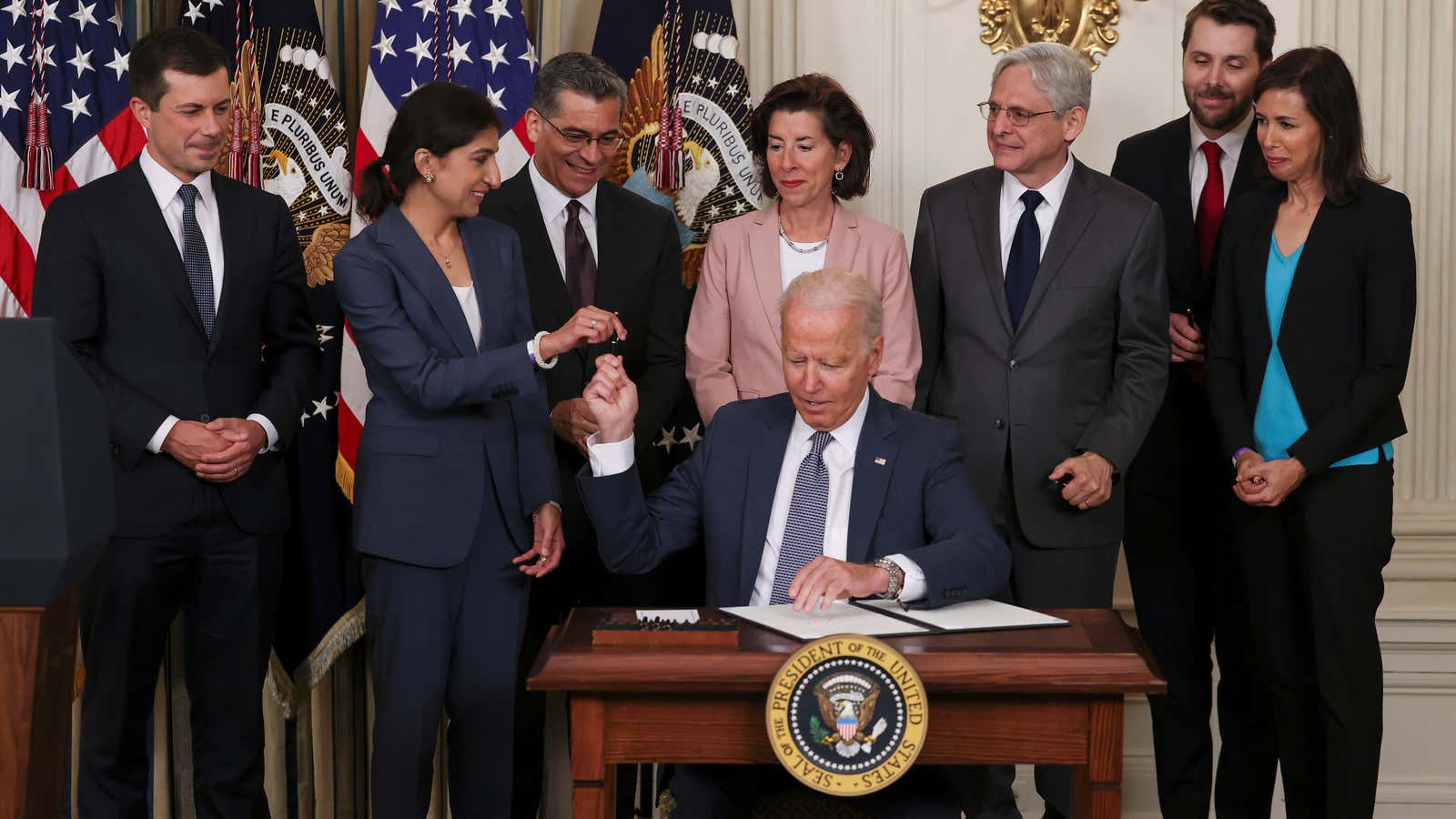In January, the US Federal Trade Commission (FTC) proposed a ban on non-compete agreements that prevent workers from moving to another similar company or starting a business in the same field, a decision that could potentially increase employee earnings by $300 billion per year.
US president Joe Biden first endorsed expanded regulation of non-compete contracts in a July 2021 executive order, where he called on the FTC to police the unfair use of any clauses in employee agreements that limit worker mobility.
Which industries use non-compete clauses the most?
The most common argument for the necessity of non-compete clauses is the safeguarding of valuable trade secrets. But a recent report by the US Treasury Department found that employers often ask workers to sign non-compete clauses in fields without sensitive workplace information. It found that 14% of workers earning less than $40,000 annually have non-compete agreements, despite their income group possessing trade secrets at less than half the rate of their higher-earning equivalents.
In fact, the report showed that non-compete agreements have become standard across almost every industry, trade secrets or not. The agreements have become so ubiquitous that only 10% of workers report negotiating their non-compete agreement, with 38% not realizing they even could.
The report also cited a 2015 study by economists Evan Starr at the University of Illinois and Norman Bishara and JJ Prescott at the University of Michigan, which revealed that workers in the information and tech industry reported signing the most non-compete clauses. A more recent study found that 1 in 3 tech workers are bound by non-compete clauses. That study also found a high rate of non-compete agreements in engineering, finance/insurance, corporate management, and mining/extraction.
Officials at the FTC have argued that, instead of protecting company secrets, non-compete clauses are instead often used to prevent other companies from poaching their employees with higher salaries.
The federal agency will allot 60 days for input from the public before moving to make the proposal final. Companies will then have six months to terminate existing non-compete clauses.
The public weighs in on the FTC’s proposed ban
In the meantime, the FTC’s website has posted public submissions from American workers explaining what the ban would mean to them. A selection of the responses so far makes pretty clear where workers stand on the issue.
“My dad lost his job after his union failed to reach an agreement with his previous employer, but because the old contract had a non-compete clause he was unable to work around our home. As a result, he now drives 50 miles across the state border for his current job.” — Jennifer Lee, Illinois
“My son, an orthodontist, had a job with a multispecialty dental national chain. He was trapped. He wanted to set up an office 19 miles away from the chain’s office, but the contract said 20 miles. He had to start a new office 25 miles away for nearly double the money.”— Marvin Chinitz, New York
“As a physician working in a community that is poorly served, I very much support this rule. Current non-compete causes force physicians to leave our state if they want or need to change jobs. This worsens our state’s physician shortage, and discourages providers from moving to the area.”— David Kenneally, Nevada
“I am a geneticist at Stanford University, and I am co-founding a biotech startup that aims to discover new cancer immunotherapies. Many of the most talented geneticists, immunologists, cancer biologists, and other scientists with unique and valuable skill sets for drug development are bound by non-competes that prevent them from leaving jobs at big pharma companies to join biotech startups like mine. The result is artificial scarcity in the market for top scientific talent — a phenomenon that precludes healthy competition between industry incumbents and new entrants.”— Connor Duffy, California
“As a freelance composer-performer, I have been adversely affected by non-compete agreements that limit the repetition of concert programs and compositions (operas, music theater) in particular geographic areas over a length of time, which can be up to 5 years! This has made it very difficult to earn a living and to keep those works and programs alive and viable.”— Kristin Norderval, New York
“Non-complete clauses in my husband’s employment contracts have cost my family tens of thousands of dollars over the years. For us, a middle-class income family, banning non-compete clauses would offer opportunities for my husband to advance his career without these major financial roadblocks. It would also save the government on unemployment benefits during the time workers are not allowed to work in their own field. Imagine that, wanting to work, being great at your job, being wanted by another employer, but being forbidden to change jobs. It’s the opposite of the American dream.” — Susan Wheeler, Montana
Related stories:
💰 The FTC thinks banning non-compete agreements could increase American wages by $300 billion per year
⚖️ The ongoing big tech antitrust cases to watch in 2023
📺 The Federal Trade Commission wants to make it easier for you to cancel subscriptions
